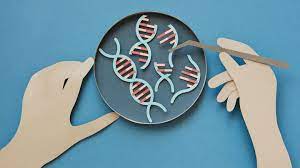Genetic testing has become a critical tool in the field of healthcare, especially when it comes to understanding and managing conditions like ovarian cancer. For black women who are diagnosed with ovarian cancer, there are specific considerations and insights related to genetic testing that can significantly impact their treatment decisions, family planning, and overall well-being. In this article, we will explore the importance of genetic testing for black women with ovarian cancer, the unique factors that may affect their testing options, and how this information can empower them to make informed choices.
Understanding Genetic Testing
The Role of Genetics in Ovarian Cancer
Ovarian cancer is influenced by various genetic factors that can predispose individuals to the disease. Genetic testing involves analyzing specific genes, such as BRCA1 and BRCA2, which are linked to an increased risk of ovarian cancer. These tests can help determine the likelihood of developing the disease and guide personalized treatment strategies.
Benefits of Genetic Testing
Genetic testing provides several benefits to black women diagnosed with ovarian cancer. It helps identify hereditary factors that contribute to cancer risk, allowing for early detection and proactive measures. Moreover, knowing one’s genetic makeup can aid in tailoring treatments for better outcomes.
Unique Considerations for Black Women
Disparities in Genetic Testing Access
Despite the benefits of genetic testing, black women often face disparities in accessing these services. Socioeconomic factors, lack of awareness, and limited healthcare access can contribute to reduced genetic testing rates among this demographic.
Importance of Representation
Representation in genetic research is crucial. Historically, genetic studies have been skewed towards populations of European descent, leading to gaps in knowledge about genetic variations in other ethnic groups. It’s essential for black women to participate in genetic studies to ensure accurate and relevant information.
Making Informed Decisions
Discussing Testing Options with Healthcare Providers
Black women diagnosed with ovarian cancer should have open conversations with their healthcare providers about genetic testing. These discussions should cover the potential benefits, limitations, and implications of the results.
Family Planning and Risk Assessment
Genetic testing results can impact family planning decisions. For instance, if a genetic mutation is identified, family members might also be at risk. Genetic counseling can help individuals understand the implications and guide family members in their testing decisions.
Empowerment Through Knowledge
Breaking the Stigma
Genetic testing can sometimes be stigmatized due to misconceptions and fears. Black women should be empowered with accurate information to dispel myths and make informed choices that positively impact their health.
Personalized Treatment Strategies
With genetic testing results in hand, healthcare providers can develop personalized treatment plans tailored to each individual’s genetic makeup, ensuring the most effective and targeted approach to managing ovarian cancer.
Conclusion
In the journey of battling ovarian cancer, genetic testing offers a beacon of hope for black women. It provides insights that enable informed decisions about treatment, family planning, and proactive health management. By actively participating in genetic testing discussions and embracing the knowledge it brings, black women can take charge of their health, break down barriers, and inspire a healthier future for themselves and their communities.
FAQs
1. Is genetic testing painful?
Genetic testing usually involves a simple blood test or saliva sample and is generally not painful.
2. Can genetic testing predict all types of cancer?
Genetic testing primarily focuses on identifying genetic mutations associated with specific types of cancer, but it may not predict all types.
3. How much does genetic testing cost?
The cost of genetic testing can vary widely. Some insurance plans may cover it, while others may not.
4. Can genetic testing results change over time?
Genetic testing results are usually consistent, but advancements in research may lead to additional insights in the future.
5. How can I find genetic counseling services?
You can ask your healthcare provider for recommendations or search for genetic counseling services in your area.



